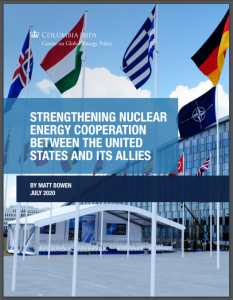Full Title: Strengthening Nuclear Energy Cooperation between the United States and Its Allies
Author(s): Matt Bowen
Publisher(s): Columbia University Center on Global Energy Policy
Publication Date: July 28, 2020
Full Text: Download Resource
Description (excerpt):
Nuclear energy cooperation between the United States and its allies has been important for over a half century. Bilateral cooperation agreements with key countries date back to the 1950s, and the United States played a principal role in the development of several allied nuclear energy programs. Today, the international nuclear energy marketplace has changed, and the supply chain is globalized—the US program, for example, depends on working with allies for major safety-related components. However, limitations imposed by legacy US statutes and other obstacles are hampering greater collaboration in areas that would enhance the country’s nuclear program today. Developing advanced reactors to produce dispatchable zero-carbon electricity and heat as part of global efforts to address climate change would be aided by greater cooperation and utilization of resources and financing across countries.
Deeper cooperation with like-minded allies would also allow the United States to better compete against other supplier countries that have different commercial and geopolitical objectives. If the challenges facing the US nuclear program are not overcome, the country risks further ceding its role as a leading nuclear technology exporter to China and Russia. Already China and Russia are growing their domestic nuclear energy programs and offering attractive financing to prospective customers of this technology around the world. These nuclear competitors may place differing priorities on areas such as nonproliferation, and therefore maintaining a US role in the nuclear supplier regime is connected with national security considerations.
This paper, part of the Center on Global Energy Policy at Columbia University’s nuclear power program, examines part of what may be required for the United States to regain momentum in the nuclear power industry after an erosion of domestic capabilities stemming from a long hiatus in new reactor orders. The paper discusses the historical importance of nuclear cooperation between the United States and allies, some of the challenges that the US and some allied nuclear energy programs are facing, and how cooperation could be reinvigorated to the benefit of the United States and its allies.
